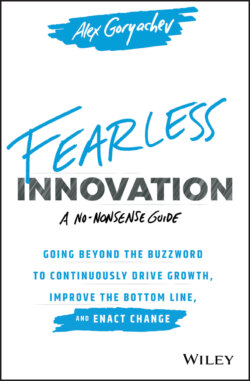Читать книгу Fearless Innovation - Alex Goryachev - Страница 9
Okay, But WTF Is Innovation?
ОглавлениеI’m glad you asked.
Innovation isn’t a thing, it’s a mindset and attitude made of up clear principles—those discussed throughout this book—that help individuals, organizations, and societies adapt to change, survive and grow, progress and prosper. As the world continues to evolve, innovation enables our communities, businesses, and selves to evolve with it. Innovation is more art than science, but its principles can easily be put into practice.
When truly baked into a company’s culture, innovation is a constant, whether the company is working on large initiatives or small projects. Yet, keeping it alive requires focused effort—innovation is not a one-time event. It drives the survival of the fittest and, whether it is Darwinian evolution or God’s plan, it is a continuous process. The only way for a company’s business strategy to evolve, then, is by embracing innovation.
Change happens naturally; innovation doesn’t. It can’t be “checked in on” from time to time; it has to be central to any organization and understood by employees from top to bottom—nothing short of a culture of constant, conscious awareness and transformation. Otherwise, innovation will not be prioritized, meaning organizations, and their leaders, will be stuck in the present, which will quickly become the past.
Speaking of the past, innovation’s nothing new either: it has been taking place since the first humans began walking upright on two feet. What’s changed over millions of years, though—and what is always changing—is the environment we’re innovating in, and how the concept is applied. There are now more tools than ever for innovation, but there is also more pressure from consumers, citizens, shareholders, employees, leaders, and business owners to “innovate” by any means possible. Progression is the way of the world, and organizations exist only when they serve human ambitions, meeting the demands of progress.
We’ve entered the Fourth Industrial Revolution, a time in which we’re experiencing rapid technological, social, and cultural change. Such revolutions always shift the balance of power and create winners and losers—those businesses that can’t keep up will languish and perish. For example, in 2018 the innovation consulting firm Innosight found that between 1964 and 2016, the average tenure of companies on the S&P 500 narrowed from thirty-three years to twenty-four years.4 This tenure is forecasted to continue to shrink, down to twelve years by 2027, by which time more than three-quarters of the S&P 500 will consist of new companies that we have not yet heard of.5
Still, most companies don’t seem that concerned. As the author and social commentator Scott Adams, of Dilbert fame, pointed out, “Large corporations welcome innovation and individualism in the same way the dinosaurs welcomed large meteors.”6 We can toss the word around as much as we want, but unless the concept is given the attention it deserves, we, too, will end up extinct. Most leaders, particularly middle managers, feel that they have enough to worry about as it is and tend to focus on what’s in front of them at the moment. Keep the shareholders happy and the business profitable, and whoever’s next in line can worry about the future. They look at innovation as something that isn’t essential to their business or job, failing to realize that innovation is actually essential to everyone’s job. Sadly, they’re missing out on the new reality that foresight for the long-term is just as important as insight into the short-term.
Instead of producing a real impact, talk of innovation generates way more slogans than clear, actionable results. It also causes many leaders to enter anxiety mode. They deny the need to evolve, or they grasp at straws for a concept of innovation that either doesn’t exist or is completely irrelevant for their organizations. In response, like so many of us, they turn a blind eye to what’s right there in front of them, ignoring the current pace of change we’re experiencing and placing their attention elsewhere. We do this in our personal and professional lives all the time, getting trapped in tactical issues, tangible problems we must address immediately, without understanding the underlying purpose, the bigger picture, or even our full potential.
